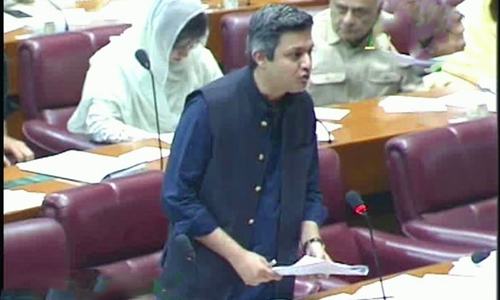PM hits back at opposition, says those calling him 'selected' were themselves nurtured by dictators

Prime Minister Imran Khan on Saturday lashed back at the opposition's use of the 'selected' slur for him, saying the parties accusing him today were themselves "manufactured in the nursery of military dictatorship".
The remark was a reference to the PPP and PML-N founders' allegedly close relationships with the military strongmen of their era.
Addressing the last sitting of the budget session in the National Assembly — in the absence of the opposition, which had walked out after a failed attempt to point out lack of quorum — the prime minister quoted former US secretary of state Condoleezza Rice as saying in her biography that former military ruler Pervez Musharraf had been asked to drop corruption cases against members of the current opposition.
The Americans collaborated to have the NRO (National Reconciliation Ordinance) signed because it was in their interest, the prime minister said.
He said Rice's account showed that "those talking about [me being] 'selected' were themselves manufactured in the nursery of military dictatorship".
Starting his address with a comment about Opposition Leader Shehbaz Sharif's speech, Prime Minister Imran said the opposition leader had regretted the fall in the rupee's value against the dollar, yet somehow failed to mention that it was necessitated because "this government inherited the largest current account deficit in Pakistan's history of $19.5 billion."
He said a major reason for the shortfall of the US dollar in the country was money laundering carried out by the "ruling elite" of the country in the past.
The prime minister alleged that the Zardari family had laundered money out of the country through hundi and hawala networks and that the Sharif family did so by means of Hill Metal Establishment and Hudaibiya Paper Mills.
"How can they [opposition members] talk about the dollar when they themselves are responsible for the situation?" he asked.
Referring to Shehbaz, Imran said a man facing charges of corruption worth billions over the past 30 years was made head of the Public Accounts Committee, which is supposed to protect the public's interests.
"Those who left the country in record deficit are demanding answers about the economy from the government," he said, talking about the previous PML-N government.
The premier congratulated members of his government and allied parties for their participation in the budget session and "for delivering quality speeches". He heaped special praise on Minister of State for Revenue Hammad Azhar for his "composure" and the manner in which he conducted the budget session, saying: "He has now earned the federal ministership for himself."
'Loopholes for money-laundering to be closed'
Prime Minister Imran also lauded his economic team for narrowing the country's current account deficit by 30 per cent.
He revealed that the government will now launch a full-fledged crackdown on money-laundering and the loopholes previously used for the crime will be closed.
"We are making every effort to ensure that the burden of this difficult time is borne by those who can afford it," the premier told the lower house, adding that the government has minimised the burden on the lower-income classes through the Ehsas programme, a power subsidy and housing schemes.
He also thanked the Pakistan Army again for freezing its budget for the next year in view of the economic hardships facing the country.
"[Army Chief] Gen Qamar Javed Bajwa especially told me that the [army] desires that the money saved should be spent on Balochistan and Fata," he said.
Opposition objects to increased ECP expenditure
The National Assembly earlier in the day voted on supplementary grants of previous years.
Members of major opposition parties, including the PPP and PML-N, objected to increased expenditures of the Election Commission of Pakistan (ECP) in the past year.
Former premier Shahid Khaqan Abbasi said that the ECP had "failed to hold transparent elections [even though the government provided] them an additional amount of Rs20 billion".
"Last year's elections were controversial. The people and international institutions have not recognised them. It is unfortunate that we are unable to hold transparent elections," he said.
He also questioned the decision to deploy troops inside polling stations during the upcoming elections in tribal areas.
The opposition tried to disrupt the proceedings by pointing out lack of quorum while the assembly was voting on supplementary grants but the bid failed as Munazza Hassan — presiding over the sitting in the absence of speaker and deputy speaker — declared the house in order after a head count.
Meanwhile, Leader of the Opposition in the National Assembly Shehbaz Sharif, in an informal conversation with some reporters, said that the "ailing economy can only be healed by holding midterm elections".












































